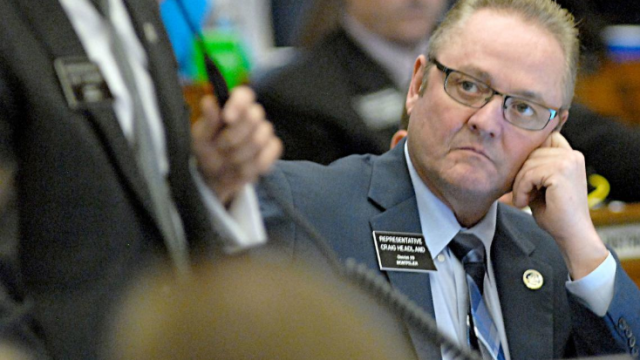House Passes Bill to Use Legacy Fund to Replace the Income Tax, Democrats Incorrectly Say It Will Make State More Reliant on Oil Taxes

Not so long ago I interviewed Rep. Craig Headland for Plain Talk about his bill to use Legacy Fund earnings to replace the personal and corporate income taxes.
Here’s the audio:
The bill, HB1530, would transfer Legacy Fund earnings into an income tax reduction fund. Over time that fund would be used to replace income tax collections with the goal being to reduce the income taxes down to nothing.
I’ve never been a fan of the Legacy Fund. Locking up billions of taxpayer dollars in a fund with no defined purpose for it is a good way to see that money spent very stupidly. Leveraging the fund to effect the elimination of the income tax seems like one of the least dumb things we could do with the money.
Today the legislation passed in the state House on a 61 – 31 vote.
North Dakota House approves plan to tap Legacy Fund for income tax reductions https://t.co/gR7E6AhHEz #ndpol
— John Hageman (@jhageman_) February 14, 2019
Democratic legislative leaders are denouncing the bill, but their arguments fall short.
Here’s Rep. Alisa Mitskog, the ranking Democrat on the House Finance and Taxation committee, as quoted in a press release (see below):
North Dakota continues to become more dependent on oil and gas revenues. Proposals like this will only make us even more dependent. North Dakota has the most volatile revenue of all states, after Alaska. North Dakota also has some of the lowest personal and corporate income taxes in the country. We need a balanced tax policy in North Dakota that does not harm critical programs and does not put a financial burden on future generations.
The problem with this argument is that this bill doesn’t really make us more reliant on oil and gas taxes. If that were true, I could understand the concern. North Dakota has a commodity-driven economy. That means a lot of ups and downs in revenues. The last thing we want is state revenues tied even more than they already are to the oil industry.
But this bill doesn’t use oil tax revenues to eliminate the income tax. It uses Legacy Fund earnings.
That may seem like I’m being facetious, because the Legacy Fund’s principal comes from a portion of oil tax collections. But the earnings from the Legacy Fund, derived from the interest derived on that principal, are a different revenue source entirely.
Whatever happens with the oil industry – whether prices and production go up or down – that principal is going to remain the same. That principal is going to keep generating revenues. Which, in turn, will be a steady source for income tax reduction and, eventually, elimination.
And even as we use Legacy Fund earnings for that purpose, the principal in that fund will continue to grow as it receives additional deposits of oil tax revenues.
Now here’s House Minority Leader Josh Boschee, as quoted in the same press release:
In 2008, the people of North Dakota soundly rejected a measure that would have reduced personal and corporate income taxes, but the Legislature has chipped away at income taxes ever since. As a result we’ve seen cuts after cuts in essential services. Ten years later the Legislature hasn’t learned its lesson.
We need to have a frank discussion on the direction we want to take tax policy in North Dakota. Income tax, property tax, and sales tax need to be balanced. Using the Legacy Fund to eliminate income taxes is not the answer. The voters enacted the Legacy Fund to provide for legacy projects, not to support a shell game that robs Peter to pay Paul.
I’m not sure that invoking the outcome of a ballot measure from more than a decade ago is all that relevant to a tax debate in 2019. As for Boschee’s claim that income tax reductions have resulted in “cuts in essential services,” I would argue that the problem has never been revenue. It was spending.
During the oil boom days the politicians – including Rep. Boschee – blew up the state budget. The post-boom cuts were all about bringing spending back down to earth. The chart below, prepared by Legislative Council, shows the trend for general fund spending. As you can see it boomed, and then it busted, and yet even after the cuts of recent budget cycles the state has still seen a nearly 50 percent increase in general fund spending since that 2008 vote Boschee is talking about:

Tax reductions were never the problem. Overspending lawmakers were.




